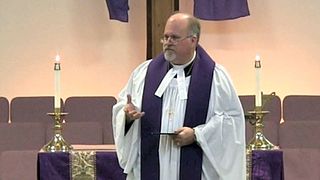Related Research Articles

From the earliest days of the Christian faith, Christians have honored holy matrimony as a divinely blessed, lifelong, monogamous union, between a man and a woman. According to the Episcopal Book of Common Prayer (1979), reflecting the traditional view, "Christian marriage is a solemn and public covenant between a man and a woman in the presence of God," "intended by God for their mutual joy; for the help and comfort given one another in prosperity and adversity; and, when it is God's will, for the procreation of children and their nurture." However, while many Christians might agree with the traditional definition, the terminology and theological views of marriage have varied through time in different countries, and among Christian denominations.
Speaking in tongues, also known as glossolalia, is a practice in which people utter words or speech-like sounds, often thought by believers to be languages unknown to the speaker. One definition used by linguists is the fluid vocalizing of speech-like syllables that lack any readily comprehended meaning, in some cases as part of religious practice in which some believe it to be a divine language unknown to the speaker. Glossolalia is practiced in Pentecostal and charismatic Christianity, as well as in other religions.
In Judaism, the Holy Spirit, also known as the Holy Ghost, is the divine force, quality, and influence of God over the universe or over his creatures. In Nicene Christianity, the Holy Spirit is the third person of the Trinity. In Islam, the Holy Spirit acts as an agent of divine action or communication. In the Baha’i Faith the Holy Spirit is seen as the intermediary between God and man and “the outpouring grace of God and the effulgent rays that emanate from His Manifestation.”

John the Baptist was an itinerant preacher active in the area of Jordan River in the early 1st century AD. He is also known as John the Forerunner in Christianity, John the Immerser in some Baptist Christian traditions, and Prophet Yahya in Islam. He is sometimes alternatively referred to as John the Baptizer.

In religion and theology, revelation is the revealing or disclosing of some form of truth or knowledge through communication with a deity or other supernatural entity or entities.

Samuel is a figure who, in the narratives of the Hebrew Bible, plays a key role in the transition from the period of the biblical judges to the institution of a kingdom under Saul, and again in the transition from Saul to David. He is venerated as a prophet by Jews, Christians, and Muslims. In addition to his role in the Hebrew Scriptures, Samuel is mentioned in the New Testament, in rabbinical literature, and in the second chapter of the Qur'an. He is also treated in the fifth through seventh books of Josephus's Antiquities of the Jews, written in the first century CE (AD). He is first called the Seer in 1 Samuel 9:9.

Anointing is the ritual act of pouring aromatic oil over a person's head or entire body.

A spiritual gift or charism is an extraordinary power given by the Holy Spirit. These are believed by followers to be supernatural graces which individual Christians need to fulfill the mission of the Church. In the narrowest sense, it is a theological term for the extraordinary graces given to individual Christians for the good of others and is distinguished from the graces given for personal sanctification, such as the Seven Gifts of the Holy Spirit and the fruit of the Holy Spirit.

In Islam, Jesus is believed to be the penultimate prophet and messenger of God (Allah) and the Messiah. He is also considered to be the last prophet sent to guide the Children of Israel, being revealed the third holy book called the Injīl.

Nontrinitarianism is a form of Christianity that rejects the mainstream Christian doctrine of the Trinity—the belief that God is three distinct hypostases or persons who are coeternal, coequal, and indivisibly united in one being, or essence. Certain religious groups that emerged during the Protestant Reformation have historically been known as antitrinitarian.

The Church of God of Prophecy is a Holiness Pentecostal Christian church. It is one of five Church of God bodies headquartered in Cleveland, Tennessee that arose from a small meeting of believers who gathered at the Holiness Church at Camp Creek near the Tennessee/North Carolina border on Saturday, June 13, 1903.

In Christianity, a minister is a person authorised by a church or other religious organization to perform functions such as teaching of beliefs; leading services such as weddings, baptisms or funerals; or otherwise providing spiritual guidance to the community. The term is taken from Latin minister.
Christian counseling is distinct from secular counseling. According to the International Association of Biblical Counselors, Biblical counseling "seeks to carefully discover those areas in which a Christian may be disobedient to the principles and commands of Scripture and to help him learn how to lovingly submit to God's will." Christian counselors, therefore, approach psychology through the lens of the Bible. They see the Bible as the source of all truth.

Ellen G. White, one of the co-founders of the Seventh-day Adventist Church, has been extremely influential on the church, which considers her a prophet, understood today as an expression of the New Testament spiritual gift of prophecy. She was a voluminous writer and popular speaker on health and temperance. Her teachings are preserved today through over 50,000 manuscript pages of her writings, and the records of others.

Muhammad's views on Christians were shaped through his interactions with them. Muhammad had a generally semi-positive view of Christians and viewed them as fellow receivers of Abrahamic revelation. However, he also criticised them for some of their beliefs. He sent various letters to Christian world leaders inviting them to "Submission to God, Islam". According to Islamic tradition, he interacted with Christians while in Mecca.

The roles of women in Christianity have varied since its founding. Women have played an important role in Christianity especially in marriage and in formal ministry positions within certain Christian denominations, churches, and parachurch organizations.

Fear of God may refer to fear itself, but more often to a sense of awe, and submission to, a deity. People subscribing to popular monotheistic religions for instance, might fear Hell and divine judgment, or submit to God's omnipotence.

Christian theology is the theology of Christian belief and practice. Such study concentrates primarily upon the texts of the Old Testament and of the New Testament, as well as on Christian tradition. Christian theologians use biblical exegesis, rational analysis and argument. Theologians may undertake the study of Christian theology for a variety of reasons, such as in order to:
In religion, a covenant is a formal alliance or agreement made by God with a religious community or with humanity in general. The concept, central to the Abrahamic religions, is derived from the biblical covenants, notably from the Abrahamic covenant. Christianity asserts that God made an additional covenant through Jesus Christ, called the "new covenant".
A leadership style is a leader's method of providing direction, implementing plans, and motivating people. Various authors have proposed identifying many different leadership styles as exhibited by leaders in the political, business or other fields. Studies on leadership style are conducted in the military field, expressing an approach that stresses a holistic view of leadership, including how a leader's physical presence determines how others perceive that leader. The factors of physical presence in this context include military bearing, physical fitness, confidence, and resilience. A leader's conceptual abilities apply agility, judgment, innovation, interpersonal tact, and domain knowledge. Leaders are characterized as individuals who have differential influence over the setting of goals, logistics for coordination, monitoring of effort, and rewards and punishment of group members. Domain knowledge encompasses tactical and technical knowledge as well as cultural and geopolitical awareness.
References
- ↑ "Bible Gateway passage: Romans 8 - English Standard Version".
- ↑ As publicly noted by both the American Psychological Association [ citation needed ] and the Canadian Association of Psychology [ citation needed ]